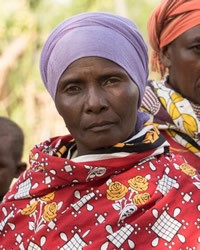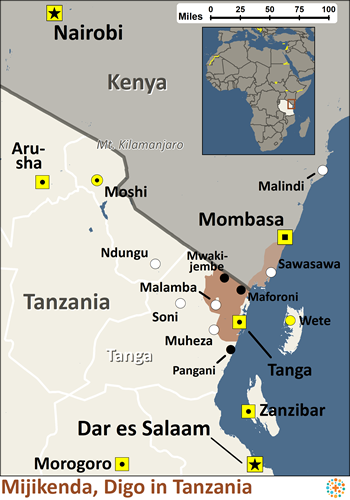The Digo are a Muslim tribe living in northern Tanzania and southern Kenya. Digo are concentrated on the northern coastal strip of Tanzania from the town of Tanga to the border of Kenya. They inhabit the fertile plains of the Pangani River, between the Usambara Mountains and the Indian Ocean.
The Digo are grouped together with eight other tribes who share a common oral history. Together, these tribes make up the Mijikenda, or "nine towns." Tradition tells us that the Mijikenda tribes originated farther north but were driven south as a result of war. During the nineteenth and early twentieth centuries, the Digo experienced a great famine. It became common for them to give either themselves or their children as "blood money" to serve as temporary collateral for a loan of food. Sadly, there were many times when the debt could not be redeemed, thus leaving them to live as slaves. Freedom was then granted when a slave converted to Islam.
For many years, the Digo have been involved in trade with Muslim Arabs. As a result, they have enjoyed a higher standard of living than most of their neighboring tribes. In addition to trading, farming and fishing are two other sources of income. Rice is their main crop since the area often floods and is very fertile.
The Digo in Tanzania maintain their cultural identity, which includes traditional customs and beliefs. However, they are strongly influenced by Swahili culture and language, which dominate coastal regions in both Kenya and Tanzania. While Swahili is the lingua franca, the Digo language (Chidigo) remains in use, particularly in rural areas, for cultural preservation and intergenerational communication.
The Digo in Tanzania are predominantly Muslim, a characteristic that shapes much of their social and religious life. Islam plays a significant role in community structure, with many following Islamic practices in areas such as education, family life and law. Islamic schools and mosques are central to their spiritual and educational life, just as in Kenya. The Digo face many of the same challenges as other coastal communities in Tanzania, including poverty and limited access to education and healthcare. Rural areas are especially affected by a lack of infrastructure, with many relying on traditional medicine due to inadequate healthcare facilities. Efforts to improve education and health services have had mixed results, as many areas still lack sufficient government investment.
Like in Kenya, the Digo in Tanzania is facing land issues, with the growing problem of land being sold to outsiders for development.
Islam is more widely accepted among the Digo than among any of the other Mijikenda tribes. Nevertheless, ties with traditional practices such as animism (the belief that non-human objects have spirits) and ancestor worship (praying to ancestors for help and guidance) still have more influence on the Digo community than Islam. One example that is very significant to the Digo is their use of blood sacrifices, especially in the exorcism of evil spirits. Witchdoctors are also consulted regularly and play an important role in their society.
Only a few Digo have studied Islam in any depth, and most of them have only a superficial knowledge of its doctrines. Nevertheless, its presence has not gone entirely unnoticed, and its influence has altered both their religious and political structures. The people have adopted new attire and diets from their Muslim Arab neighbors. However, to most Digo, the wearing of a white skull cap and the adoption of an Arab name constitute the major requirements of being Muslim. This nominal identification with Islam is referred to as "folk Islam".
The Digo people in Tanzania, like their counterparts in Kenya, face several key needs related to socio-economic development and cultural preservation. Many Digo communities in rural areas of Tanzania struggle with limited access to healthcare. There is a shortage of medical facilities, and many people rely on traditional medicine. Improving healthcare infrastructure, especially in maternal and child health services, is a significant need.
The Digo primarily depend on small-scale farming and fishing for their livelihoods. Poverty remains a major issue, exacerbated by land degradation and limited access to modern farming techniques. To enhance income from their agricultural activities, they need better agricultural support, such as access to improved seeds, modern farming tools and better market access.
Land ownership is a critical issue for the Digo, as they continue to face challenges related to the sale of ancestral land to outsiders for development.
While education has improved, many children in rural Digo communities still face barriers to accessing quality education. Infrastructure is inadequate, and schools are often underfunded, leading to high dropout rates.
Most Digo experience some degree of persecution when they become Christians, and their families disinherit many. However, there have been reports that tolerance has increased and persecution has lessened in recent years. The Digo have never been successfully reached with the gospel. Determined prayer efforts must be made to see the barriers surrounding them broken.
Ask the Lord to open the Digo's eyes to Jesus's love and to the truth of his gospel.
Pray that God will thrust forth laborers into the harvest fields of Tanzania.
Ask the Lord to send Christian medical workers to work among the Digo.
Ask the Lord to raise a robust local Church among the Digo.
Scripture Prayers for the Mijikenda, Digo in Tanzania.
https://en.wikipedia.org/wiki/Mijikenda_peoples
https://www.bing.com/videos/riverview/relatedvideo?q=Mijikenda&mid=20E8B49FE42336F48D1620E8B49FE42336F48D16&FORM=VIRE
https://malindians.com/information/mijikenda-tribe-of-kenya/#:~:text=Mijikenda%20are%20a%20Coastal%20Bantu%20community,%20a%20group%20of%20nine
https://mijikenda.co.ke/the-mijikenda-community-of-coastal-kenya/
| Profile Source: Joshua Project |


























